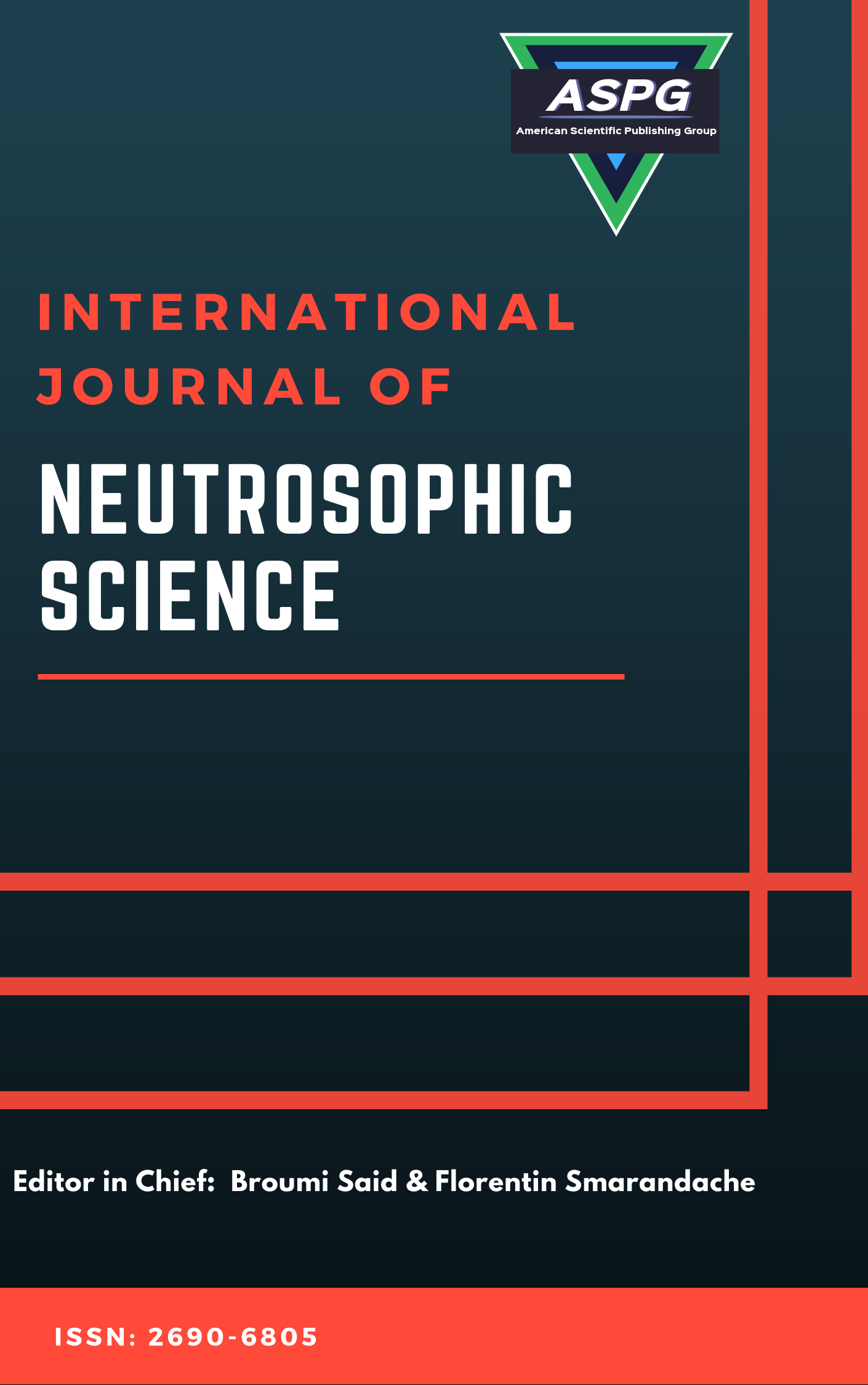

Volume 19 , Issue 1 , PP: 323-330, 2022 | Cite this article as | XML | Html | PDF | Full Length Article
V. B. Frantz Dimitri 1 * , M. G. Teresa De Jesús 2 , P. A. Edmundo Enrique 3
Doi: https://doi.org/10.54216/IJNS.190129
Investors have been flocking to the information technology (IT) industry recently. Any commercial or IT company's success is directly proportional to its employees' efforts. The workforce's contributions are crucial when it comes to the success of technology or any other business on the global stage. However, they will disregard their personal and social lives to achieve their aim. Workers in the private sector, particularly those in the information technology industry, suffer from mental health issues such as stress, depression, anxiety, and addiction. Using Neutrosophic Cognitive Maps (NCM), we evaluated the daily problem they face. The NCM decision-making system incorporates iterative tasks of resolving conflicts until the optimal answer is reached. The NCM uses neutrosophic graphs to model depending on the opinions of experts. Studying the issue with such vague data calls for an approach such as this, which eschews the use of statistics. For unlabeled data, NCM is the most effective method.
Social Problem , Neutrosophic Sets , Neutrosophic Cognitive Maps , Decision Making ,
[1] Nivetha Martin , Florentin Smarandache, Plithogenic Cognitive Maps in Decision Making, International Journal of Neutrosophic Science, Vol. 9 , No. 1 , (2020) : 09-21
[2] J. P. Hewitt and P. M. Hall, "Social problems, problematic situations, and quasi-theories," American Sociological Review, pp. 367–374, 1973.
[3] Ahmed M. Daoud , Khlid M. Hosny , Ehab R. Mohamed, Building a New Semantic Social Network Using Semantic Web-Based Techniques, Fusion: Practice and Applications, Vol. 3 , No. 2 , (2021) : 54-65
[4] Vijay K, Collaborating The Textual Reviews Of The Merchandise and Foretelling The Rating Supported Social Sentiment, Journal of Cognitive Human-Computer Interaction, Vol. 1 , No. 2 , (2021) : 63 - 72
[5] J. W. Schneider, "Social problems theory: The constructionist view," Annual review of sociology, pp. 209–229, 1985.
[6] E. Seidman and J. Rappaport, Redefining social problems. Springer Science & Business Media, 2013.
[7] G. Miller and J. A. Holstein, Constructionist controversies: Issues in social problems theory. Routledge, 2017.
[8] Yutao Han , Ibrahim M. EL-Hasnony , Wenbo Cai, Dragonfly Algorithm with Gated Recurrent Unit for Cybersecurity in Social Networking, Journal of Cybersecurity and Information Management, Vol. 0 , No. 2 , (2019) : 75-88
[9] V. K. Mago et al., "Analyzing the impact of social factors on homelessness: a Fuzzy Cognitive Map approach," BMC medical informatics and decision making, vol. 13, no. 1, pp. 1–19, 2013.
[10] E. Bakhtavar, M. Valipour, S. Yousefi, R. Sadiq, and K. Hewage, "Fuzzy cognitive maps in systems risk analysis: a comprehensive review," Complex & Intelligent Systems, vol. 7, no. 2, pp. 621–637, 2021.
[11] J. P. Carvalho, "On the semantics and the use of fuzzy cognitive maps and dynamic cognitive maps in social sciences," Fuzzy Sets and Systems, vol. 214, pp. 6–19, 2013.
[12] R. Taber, "Knowledge processing with fuzzy cognitive maps," Expert systems with applications, vol. 2, no. 1, pp. 83–87, 1991.
[13] A. J. Jetter and K. Kok, "Fuzzy Cognitive Maps for futures studies—A methodological assessment of concepts and methods," Futures, vol. 61, pp. 45–57, 2014.
[14] J. Aguilar, "Dynamic random fuzzy cognitive maps," Computación y Sistemas, vol. 7, no. 4, pp. 260–271, 2004.
[15] U. Özesmi and S. L. Özesmi, "Ecological models based on people's knowledge: a multi-step fuzzy cognitive mapping approach," Ecological modeling, vol. 176, no. 1–2, pp. 43–64, 2004.
[16] D. Carlucci, F. A. F. Ferreira, G. Schiuma, M. S. Jalali, and N. J. S. António, "A holistic conception of sustainable banking: Adding value with fuzzy cognitive mapping," Technological and economic development of economy, vol. 24, no. 4, pp. 1303–1322, 2018.
[17] J. Aguilar, "A fuzzy cognitive map based on the random neural model," in International conference on industrial, Engineering and other applications of applied intelligent systems, 2001, pp. 333–338.
[18] R. P. Alava, J. M. Murillo, R. B. Zambrano, and M. I. Zambrano Vélez, "PEST Analysis Based on Neutrosophic Cognitive Maps: A Case Study for Food Industry," Neutrosophic Sets and Systems, vol. 21, no. 1, p. 10, 2018.
[19] K. Mondal and S. Pramanik, "A study on problems of Hijras in West Bengal based on neutrosophic cognitive maps," Neutrosophic Sets and Systems, vol. 5, pp. 21–26, 2014.
[20] J. E. Ricardo, D. F. C. Flores, J. A. E. Díaz, and K. P. Teruel, An Exploration of Wisdom of Crowds using Neutrosophic Cognitive Maps, vol. 37. Infinite Study, 2020.
[21] W. B. V. Kandasamy and F. Smarandache, Analysis of social aspects of migrant labourers living with HIV/AIDS using Fuzzy Theory and Neutrosophic Cognitive Maps. Infinite Study, 2004.
[22] W. B. V. Kandasamy and F. Smarandache, Fuzzy cognitive maps and neutrosophic cognitive maps. Infinite Study, 2003.
[23] A. J. Peñafiel Palacios, J. Estupiñán Ricardo, I. A. Cruz Piza, and M. E. España Herrería, "Phenomenological hermeneutical method and neutrosophic cognitive maps in the causal analysis of transgressions against the homeless," Neutrosophic sets and systems, vol. 44, no. 1, p. 18, 2021.
[24] C. M. Villamar, J. Suarez, L. D. L. Coloma, C. Vera, and M. Leyva, Analysis of technological innovation contribution to gross domestic product based on neutrosophic cognitive maps and neutrosophic numbers. Infinite Study, 2019.
[25] S. Pramanik and S. N. Chackrabarti, "A study on problems of construction workers in West Bengal based on neutrosophic cognitive maps," International Journal of Innovative Research in Science, Engineering and Technology, vol. 2, no. 11, pp. 6387–6394, 2013.